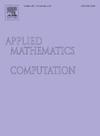A co-evolutionary model of information, behavior, and epidemics in multiplex networks: Incorporating subjective and objective factors
IF 3.5
2区 数学
Q1 MATHEMATICS, APPLIED
引用次数: 0
Abstract
The dissemination of information and the adoption of immunization behaviors are vital for preventing infection during epidemics. Positive and negative information have different influences on the decision to accept immunization behaviors, and individuals make decisions about whether to accept immunization based on both subjective cognizance and objective environmental factors. A three-layer propagation model is proposed to explore the co-evolutionary dynamics of competitive information, immunization behavior, and epidemics in multiplex networks. We consider the competitive transmission of positive and negative information under the effect of individual cognitive preference and the effect of the subjective cognizance and objective environmental factors. For the objective environmental factors, the Prospect Theory is introduced to describe the risk-related costs. Furthermore, we investigate the local group immunity phenomenon. Utilizing the MMCA (microscopic Markov chain approach) for theoretical analysis, our findings indicate that the dynamics of epidemic transmission can indeed undergo multi-stage phase transitions when there exists a competing propagation of positive and negative information. Improving individual cognitive preference for positive information is essential for making the right judgments when engaging in the immunization game process and reducing the epidemic transmission scale. In addition, individuals are encouraged to reduce the free-rider strategy and adopt immunization behavior timely during epidemic transmission, as this contributes to overall emergency management.
多重网络中信息、行为和流行病的共同进化模型:结合主观和客观因素
传播信息和采取免疫行为对于在流行病期间预防感染至关重要。积极信息和消极信息对接受免疫行为的决策有不同的影响,个体对是否接受免疫的决策既基于主观认知,也基于客观环境因素。提出了一个三层传播模型来探讨多路网络中竞争信息、免疫行为和流行病的共同进化动力学。本文考虑了个体认知偏好、主观认知和客观环境因素共同作用下的正负信息竞争传递。对于客观环境因素,引入前景理论来描述风险相关成本。此外,我们还研究了局部群体免疫现象。利用MMCA(微观马尔可夫链方法)进行理论分析,我们的研究结果表明,当存在正信息和负信息的竞争传播时,流行病的传播动力学确实可以经历多阶段的相变。提高个体对正面信息的认知偏好,对于参与免疫博弈过程中做出正确判断,降低疫情传播规模至关重要。此外,鼓励个人减少搭便车战略,并在流行病传播期间及时采取免疫行为,因为这有助于全面的应急管理。
本文章由计算机程序翻译,如有差异,请以英文原文为准。
求助全文
约1分钟内获得全文
求助全文
来源期刊
CiteScore
7.90
自引率
10.00%
发文量
755
审稿时长
36 days
期刊介绍:
Applied Mathematics and Computation addresses work at the interface between applied mathematics, numerical computation, and applications of systems – oriented ideas to the physical, biological, social, and behavioral sciences, and emphasizes papers of a computational nature focusing on new algorithms, their analysis and numerical results.
In addition to presenting research papers, Applied Mathematics and Computation publishes review articles and single–topics issues.

 求助内容:
求助内容: 应助结果提醒方式:
应助结果提醒方式:


